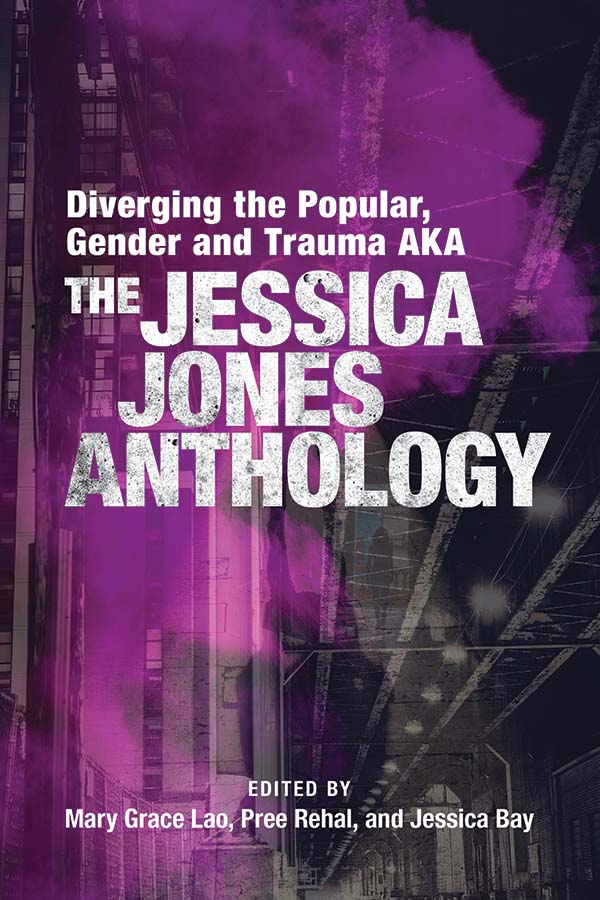
Diverging the Popular, Gender and Trauma AKA The Jessica Jones Anthology
Edited by Mary Grace Lao, Pree Rehal, and Jessica Bay
$62.99 HC / $42.99 PB (S)
282 pages, 2 illustrations
6 x 9 inches
Hardback: 978-1-77385-573-8
Paperback: 978-1-77385-574-5
Epub: 978-1-77385-577-6
Library PDF: 978-1-77385-576-9
December 2024
A collection of critical discussions of the Netflix Marvel adaptation Jessica Jones.
Jessica Jones made her first Marvel Comics appearance in Alias #1, November 2001, and went on to star in three ongoing series. In 2015 the Netflix adaptation Jessica Jones premiered to positive reviews. Following the scarred and superpowered titular character as she struggled to run a private detective agency and face her past, the show ran for three seasons and received a Hugo Award, a Peabody Award, and a Creative Arts Emmy.
Diverging the Popular, Gender and Trauma AKA The Jessica Jones Anthology brings together a diverse group of scholars to explore the evolving depiction of the superheroine as embodied in both Jessica Jones and in the series. Contributors draw on trauma-informed study, lived experience, feminist approaches, cultural studies, and more to present multifaceted analyses. Specifically addressing survivorship, trauma, masculinities, and militarization, this book makes space for conversations that recognize the diverse, multi-layered narratives and complex, sometimes contradictory depictions presented by the show.
Taking Jessica Jones as part of an evolving depiction of the superheroine, this anthology focuses not only on the content of the television series but female superheroes more broadly. It recognizes and critically discusses gendered and racialized roles and spaces, the changing expectations of fans, and the places in which media industries and fans interact. Connecting Jessica Jones to the wider Marvel Cinematic Universe, this is a thoughtful and thorough study of a ground-breaking character and boundary-pushing show.
With contributions by: Mary Grace Lao, Pree Rehal, Jessica Bay, Catherine Jenkins, Natalja Chestopalova, Sarah Stag, Eric Ross, Ian Fitzgerald, Jessica Seymour, Brett Pardy, Anastasia Salter, Bridget M. Blodgett, Kiera Obbard, Michelle Johnson, Tracey Thomas, Sorouja Moll, Caitlynn Fairbarns, Arun Jacob, Elizabeth DiEmanuele
Mary Grace Lao studies media(ted) discourses of gender-based violence, constructions of girlhood, and intersections of race and class. She is co-author of Superfans and Evangelizers: Young People’s Creative Entanglements with Promotional Culture.
Pree Rehal is a Disabled, queer, trans, and non-binary interdisciplinary artist of Punjabi decent. They are the founder of CRIP COLLAB, the Crip Art Collective Working Group, and DigiZine, a zine making program for 2SQTBIPOC youth in Toronto.
Jessica Bay works at the intersection of media and fan studies, continuously exploring the ways in which industry and audience interact. Her work can be found in the collection Animal Heroes, Villains, and Others: The Narrative Functions of Strange and Familiar Creatures in Film and Television and has been published in The Journal of Fandom Studies, The National Post, and more.
List of Figures
Introduction
Episode Guide
Part 1. A New Kind of Superhero: Film Noir and the Anti-hero
Part 1 Introduction
1. When is a Superhero Not a Superhero?
2. Defining “Rebel Femme Noir” through Genre Hybridization in Cinematic and Comics Narratives of Jessica Jones
3. “My Greatest Weakness? Occasionally I Give a Damn”: (Super)Heroic Duty, Responsibility, and Morality
4. Watch Party: Watching Jessica Jones Watch Others
5. “So Go After the Big Green Guy or the Flag Waiver”: The MCU Reality Brigade
Part 2. Portrayals of Masculinities, Male Violence, and Entitlement
Part 2 Introduction
6. From Devils to Milquetoast Little Man-Boys
7. Will Simpson and the Failure of Militarized Masculinity
8. #Killgraved: Geek Masculinity and Entitlement in Marvel’s Villains
9. Undeniably Charming, Undeniably Wicked, and our Shameful Killgrave Crush
Part 3. Surviving Trauma
Part 3 Introduction
10. “Tell Us Which One of Us Was Truly Violated”: Disrupting Narratives of Trauma, Rape, and Consent
11. Before Kilgrave, After Kilgrave: The Choreographic Effects of Trauma on the Female Body
12. Code Word, “I Love You”: Sisterhood, Friendship, and Trauma
13. “I Can’t Leave”: The Iconography of Hysteria and the Anti-superhero
14. Representations of Rape and Race
15. “AKA WWJD?”: Interrogating Gendered Ideologies and Urban Revanchism
Conclusion: Considering Jessica Jones as a Moment in Time
List of Contributors
Index